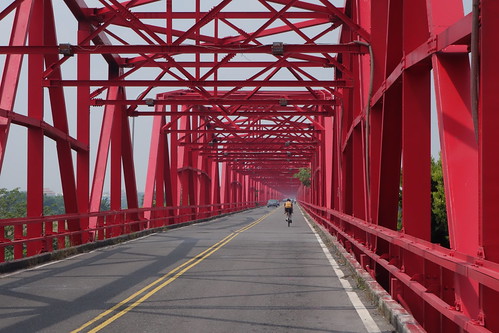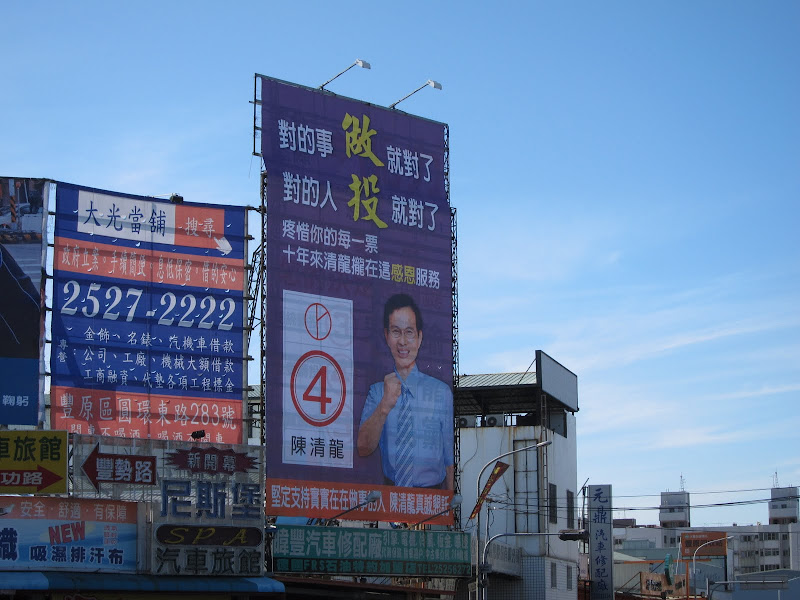Wow. New Zeitgeist: The Journalist's lead article on wed is about the KMT splitting. Wednesday night's talk show on Next TV was 2 hours of on the possibility of the KMT splitting. Radio Taiwan International also did one. It's all over the media. The rumors, stories, and news of the KMT implosion are flying about -- one can hardly keep up. Some highlights... UPDATE: Taiwan Take, the Coming Collapse of the KMT, part 2.
From the KMT news organ:
Hung Hsiu-Chu (洪秀柱), Deputy Legislative Speaker and KMT Presidential candidate in-waiting, has drawn some criticism over her “One China, One Interpretation” and cross-Strait peace agreement campaign planks. Yesterday, after visiting former KMT Chairman Lien Chan (連戰), Hung said Lien noted that a cross-Strait peace agreement was one of the “Five Visions” proposed in the 2005 Lien-Hu meeting. Lien said, “For the good of Taiwan, these visions must be carried out.”Yes, that's right, Hung sought to dispel concerns about her strange cross-strait policy by gaining the support of two-time presidential loser Lien Chan. President Ma, a hardliner and ideologue who is still powerful within the KMT even though he has done severe damage to the Party, publicly said this week that there was "no possibility" that Hung would be forced to give up the nomination. On Twitter Ben Goren of Letters from Taiwan opined that Hung was Ma's catspaw to carry out the cross-strait policies that he dare not.
Yesterday, President Ma Ying-jeou (馬英九) also expressed his support for Hung. He pointed out that “One China, One Interpretation” and “One China, Different Interpretations” both emphasized the “commonalities” as in “seeking commonalities while shelving differences.”As for Hung’s insistence on “One China,” Ma continued, “it is almost identical to my advocacy that ‘One China’ is the ROC.” “One China, One Interpretation” is the same as the KMT’s cross-Strait policy, added Ma.
It's already July and Hung still hasn't assured us she is Taiwanese. Even Ma unbent enough to do that.
How long can Hung stay the candidate with this gathering storm of opposition and laughter? Frozen Garlic remarked that KMTers are living in a bubble universe. Got a little taste of that bubble yesterday, when the author of that bad East Asia Forum piece responded to my comments on his piece.
Hung is indeed a lightweight in the KMT. While other heavyweights chose not to run and waited to be drafted, Hung at least had the courage to throw her hat into the ring. Those who felt she is not the ideal candidate should either run of persuade their preferred choice to run in the primary. They assumed Hung is not going to cross the threshold and waited for the draft to happen. When the draft did not happen, they tried to justify their stance against her by leaving or threatening to leave the party. So far, only one former legislator has done so.Bubble world at work: According to this writer, Hung is not an existential threat to the party who is making people consider leaving, it's just sour grapes by losers. Bubble world at work 2: Look at last sentence -- when those words were written, at least two had already left, one of whom had established her own party, and the KMT legislator in Changhua said "I am not running for re-election" despite having won huge the last time. The Taipei Times identified her as the 7th legislator who has declined to run.
The fact is that the KMT is facing devastation, because the flip side of this support for Hung is contempt for the Taiwanese who make the party go, and their informal leader, Speaker Wang Jin-pyng. The Taiwanese local factions are now fleeing the party, just as many of us thought they might months ago when we first identified the KMT's potential for implosion.
The Taipei Times noted in a piece on the resurrection of James Soong's political career and his emergence as a possible presidential candidate:
The PFP held a press conference in Taipei to announce its five legislative candidates for the Jan. 16 elections. Three of the candidates are former Chinese Nationalist Party (KMT) legislators, including Chang Sho-wen (張碩文), who just withdrew from the KMT earlier this week.The KMT candidate in Tainan (District 4) has also declined to run. Solidarity translates an article from the pro-KMT UDN on the situation in Changhua:
Changhua County was always blue until the November 29 elections, when it all turned green. It is a bellwether for the next presidential election. The KMT had drafted its incumbents—Wang Hui-mei 王惠美, Lin Tsang-min 林滄敏 and Cheng Ru-fen 鄭汝芬—to contest 3 of Changhua’s 4 legislative districts, and it felt optimistic about each. But Cheng has now refused her nomination, and the party is still struggling to find a candidate for the fourth district. It had drafted Chang Chin-kun 張錦昆, chief of Yuanlin Township, but he has told the party he’s not interested and recommended former Legislator Hsiao Ching-tien 蕭景田. Hsiao, in turn, has stated several times he’ll go wherever Wang does. The KMT elites’ attitude toward Wang, and Hung’s statement that “if Wang wants to continue being Speaker, the only way to do that now is to run for Legislature in a district” made Hsiao unable to see or hear anymore because he was extremely disappointed.Of course, note that Soong a key qualification of Soong's for a pan-Blue presidential run is that he is a mainlander and member of the ruling elite. But now his party is increasingly being seen as the place to which Taiwanese legislators in the KMT will bolt. Soong, who came within 3% of being President in 2000, briefly ruled a huge PFP, and then vanished into obscurity, is now being promoted in the media, back from political death as a possible savior. I suppose if one is going to be savior, one has to rise again...
A Soong-Wang ticket would be formidable and tough for Tsai to beat. The factions won't fight for the KMT in this election if Hung is the KMT's choice, but they will fight for a ticket with Wang. An advantage for Wang is that if he becomes the PFP vice presidential candidate, he can get a seat in the legislature as a party list legislator (not elected, the parties get extra seats based on their showing in the election). KMT Chairman (for how much longer?) Eric Chu has already indicated that he won't be given an extra term as a party list legislator. Solidarity commented:
Plenty of pundits are floating Wang as a PFP presidential, vice presidential, or speaker candidate, but it’s not that simple. As soon as Wang became a PFP candidate, the KMT would eject him from the party; to avoid that dignity he would have left already. But once he’s out of the party, he’s out of the Legislature as well: party-list members, unlike district representatives, serve at the discretion of their parties. That’s why Ma tried so hard to make the KMT to force Wang out earlier.However, a viable Soong run assumes that he pulls enough legislators out of the KMT to make a run of it with an enlarged PFP.
July 19th, the Party Congress. Judgment Day. Will Skynet go with Hung?
_________________
Daily Links
- EATS 2016 call for papers
- Thinking Taiwan's Taiwan Insider
- Rare gunfight, in Taoyuan over the affections of a tea shop clerk.
- Taiwan's mixed race children finally find their place
- KMT uses park disaster to attack DPP, DPP refutes
- Commonwealth profiles one of the new breed of social activists in Taiwan
- Tsai shoots ad with local Vietnamese wives, emphasizes that they are Taiwanese
- A CPI piece on the election.
- After years of shilling for the KMT and for the corporate-industrial state here in Taiwan that created our unsafe environment , and for calling for slashing regulations, plundering the US environment, and killing Americans at home (never mind Forbes' insane position on global warming), suddenly Forbes hosts an article complaining about Taiwan's safety. Thanks Forbes, you played your small part in fostering the mess here. And as a special bonus, out of thousands of images that could have been used, Forbes chose one with half-naked breasts. Vile from beginning to end.
[Taiwan] Don't miss the comments below! And check out my blog and its sidebars for events, links to previous posts and picture posts, and scores of links to other Taiwan blogs and forums!

